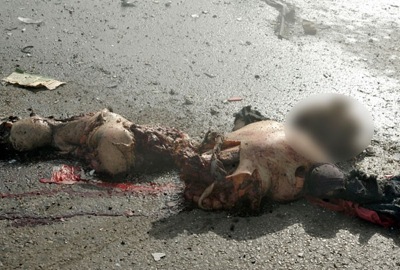
Following their military defeat at the hands of the regular army, the legions of the anti-Syrian coalition have now turned to blind terrorism.
Thus, on Friday, Syrian special services foiled an attempted attack in Aleppo, the second largest city. A suicide bomber riding on a minibus loaded with 1.2 tons of explosives, meant to destroy the densely populated neighborhood of al-Shaar, was stopped by security forces before he could detonate the device [1]
This follows the twin bomb explosions on Thursday that killed 55 people and injured 372 in Damascus. The attacks occurred almost simultaneously on a highway south of the city, during the morning rush hour when people were going to work and pupils to school. The blasts were so powerful they shook all the buildings in the capital. The attack was claimed by the terrorist group Jabhat al-nusra, the same one behind the January attack that killed 26 people in al-Midan, a neighborhood on the outskirts of Damascus.
Announcing that "the Kalashnikovs would not overthrow the regime," the armed groups and their handlers abroad are gearing up to wage a "low intensity" war against Syria [2]
In late April, the Loutfallah 2, a cargo ship, was intercepted [3] in Lebanese waters, transporting 150 tons of weapons to be delivered to Syrian fighters, including 155mm shells earmarked in theory for heavy artillery, something the the armed opposition does not have. The explosive charge of these shells, which contain a mixture of TNT and RDX, may however be used to manufacture extremely powerful explosives.
Moreover, at least five explosives experts recently arrived in Syria from Palestinian refugee camps in Lebanon.
One of them, Abdel Ghani Jawhar, chief bomb maker of the pro-Saudi terrorist group Fatah al Islam, was killed in the border town of Al-Qusayr when the bomb that he was planting against the Syrian army went off accidentally. A chemistry graduate, he went to Syria to teach fighters how to develop explosives and car bombs [4].
While Western and Gulf states media allege that the armed groups are defending the population against the "regime’s bloody crackdown," this version has been consistently contradicted by the facts since the beginning of the operation to destabilize the country in March 2011. Seeking to cause chaos to justify a foreign "humanitarian" intervention, it is indeed the mercenaries sponsored by the international coalition who are perpetrating these attacks, which target not only the army and the police, but also the civilian population.





[1] "Un terroriste actionne sa ceinture explosive en tentant de faire exploser un microbus bourré d’explosives à Alep," SANA, 11 May 2012.
[2] "ALBA countries join chorus condemning "Contras" interference in Syria," Voltaire Network, 7 February 2012.
[3] An arms-laden cargo plane had already been seized in February this year: “Lebanese security officials seize suspicious cargo from US, Brazil”, Voltaire Network, 8 February 2012.
[4] "In Syria, Lebanon’s Most Wanted Sunni Terrorist Blows Himself Up," by Aryn Baker and Rami Aysha, Globalspin, 23 April 2012.

















Stay In Touch
Follow us on social networks
Subscribe to weekly newsletter